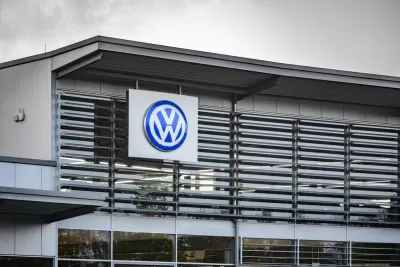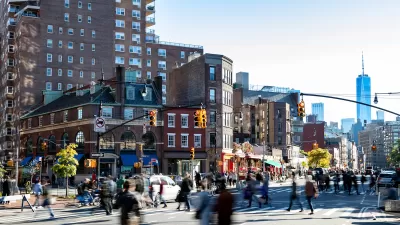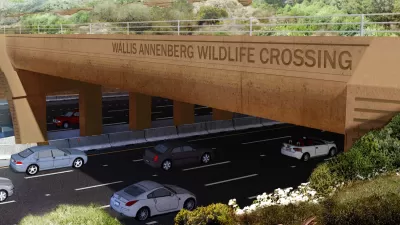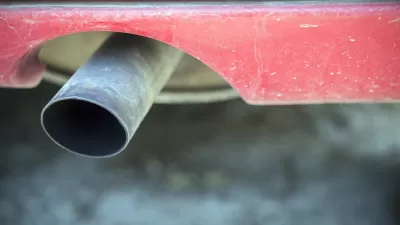The record deal between Volkswagen, the federal government, California, and consumers directs $5 billion to states to mitigate air pollution. The remainder will be used to compensate consumers who purchased the tampered diesel cars.

As readers may recall, "VW admitted in September 2015 to installing secret software in its diesel cars to cheat exhaust emissions tests and make them appear cleaner in testing than they really were," explains David Shepardson for Reuters. "In reality, the vehicles emitted up to 40 times the legally allowable pollution levels."
On Oct. 25, "U.S. District Judge Charles Breyer in San Francisco signed off on VW's settlement [reached in June] with federal and California regulators and the owners of the 475,000 polluting diesel vehicles in a pivotal moment for the world's No. 2 automaker as it tries to move past a scandal that has engulfed it for more than a year," adds Shepardson
The settlement was reached with the U.S. Justice Department, Federal Trade Commission, the state of California and vehicle owners who had filed a class action lawsuit against VW. Volkswagen has admitted to misleading regulators and still faces an ongoing criminal investigation.
Volkswagen agreed to spend up to $10.033 billion on the buybacks and owner compensation and $4.7 billion on programs to offset excess emissions and boost clean-vehicle projects.
VW "has offered to pay $2.7 billion for unspecified environmental mitigation and an additional $2 billion to promote zero-emissions vehicles," according to Deutsche Welle (DW).
According to a June 26 article in KPCC, California "will receive about $380 million to support environmental programs and about $800 million in investments for zero emissions technologies, California Attorney General Kamala Harris said."
However, the court-approved settlement doesn't mean an end to VW's costs. Scroll down for details.
Not all auto owners had agreed to the June settlement, which is why Breyer's actions can resolve this part of the scandal.
Breyer turned away objections from car owners who thought the settlement did not provide enough money, saying it "adequately and fairly compensates" them. Owners will get the pre-scandal "trade in" value of the vehicle and $5,100 to $10,000 in additional compensation.
The settlement covers 2.0-liter polluting diesel Beetle, Golf, Jetta, Passat and Audi A3 cars from the 2009 through 2015 model years. Up to 490,000 people will take part in the settlement because some vehicles had multiple owners.
What about those owners who want to keep their cars?
Remember, while these vehicles my be polluting 40 times as much as they should, owners are still enjoying great vehicle performance and fuel economy.
Nearly 340,000 owners have registered to take part in the settlement. About 3,500 owners have opted out. Volkswagen must fix or buy back 85 percent of the 475,000 vehicles under the agreement by June 2019 or face additional costs.
Owners have until September 2018 to submit paperwork to sell back vehicles. VW will have to destroy repurchased vehicles unless it wins approval for fixes.
The court-approved agreement still allows 15 percent of these heavily polluting diesel vehicles to remain on the road should their owners opt-out of buy-back or repair, should the company find a fix to the problem that wins approval by regulators. A March post suggested that these vehicles be banned from city streets.
"Only in Germany, the home of the Volkswagen group, has a mandatory recall been ordered," reported Pablo Valerio .
More costs yet to come for VW
The settlement dealt only with 2.0-liter vehicles and didn't include federal fines.
VW still faces billions more in costs to address 85,000 polluting 3.0-liter vehicles and Justice Department fines for violating clean air laws. It also faces lawsuits from at least 16 U.S. states for additional claims that could hike the company's overall costs.
Comparison to other industry malfeasance
While the court-approved settlement represents the "largest civil settlement worldwide ever reached with an automaker accused of misconduct," notes Shephardson, it is by no means the largest in any industry.
While huge, the approved deal was still smaller than the $246 billion settlement reached by cigarette makers with 46 U.S. states in 1998 and the $53 billion by BP to address costs and penalties arising from the 2010 Gulf of Mexico oil spill.
On that last incident, the costs have risen to $61.6 billion, reported Steven Mufson on July 14 for The Washington Post. However, the settlement with BP was for $18.7 billion. Bear in mind, while the BP oil spill was preventable, it was not intentional like VW's 'dieselgate.'
Related in Planetizen:
- Volkswagen Settles in Cheating Scandal to the Tune of $16 Billion, June 29, 2016
- Volkswagen Caught Cheating on Emissions Testing, September 23, 2015
Hat tip to AASHTO Journal.
FULL STORY: U.S. judge approves $14.7 billion deal in VW diesel scandal

Pennsylvania Mall Conversion Bill Passes House
If passed, the bill would promote the adaptive reuse of defunct commercial buildings.

Planning for Accessibility: Proximity is More Important than Mobility
Accessibility-based planning minimizes the distance that people must travel to reach desired services and activities. Measured this way, increased density can provide more total benefits than increased speeds.

World's Largest Wildlife Overpass In the Works in Los Angeles County
Caltrans will soon close half of the 101 Freeway in order to continue construction of the Wallis Annenberg Wildlife Crossing near Agoura Hills in Los Angeles County.

Amtrak Takes Lead on Texas Central Rail
The high-speed rail project isn’t a done deal, but if it moves forward, trains could begin operating in 2030.

Maine Approves Rent Relief Program
Legislators hope the assistance program will help struggling low-income households avoid eviction.

How Transit Architecture Impacts Real and Perceived Safety
More than a third of Americans believe major transit systems are too unsafe to ride. The built environment can change that.
City of Costa Mesa
Licking County
Barrett Planning Group LLC
HUD's Office of Policy Development and Research
Mpact Transit + Community
HUD's Office of Policy Development and Research
Tufts University, Department of Urban and Environmental Policy & Planning
City of Universal City TX
ULI Northwest Arkansas
Urban Design for Planners 1: Software Tools
This six-course series explores essential urban design concepts using open source software and equips planners with the tools they need to participate fully in the urban design process.
Planning for Universal Design
Learn the tools for implementing Universal Design in planning regulations.
























